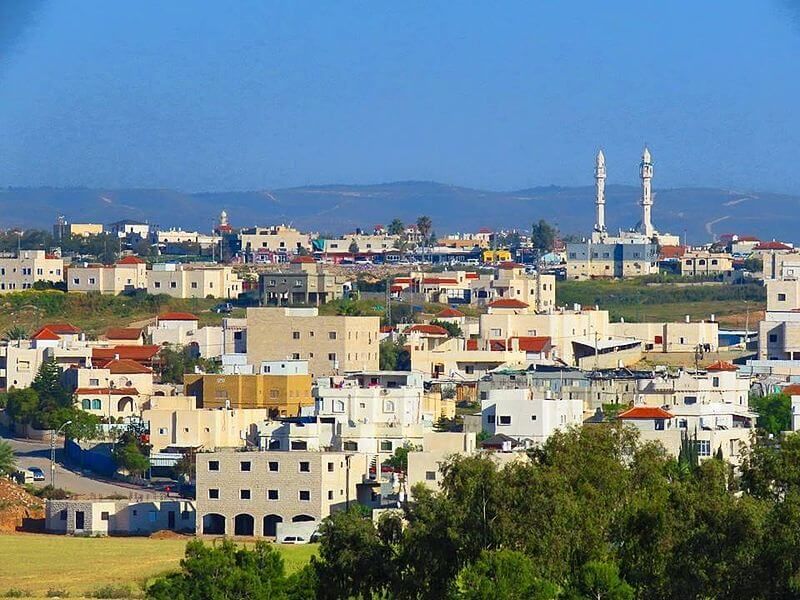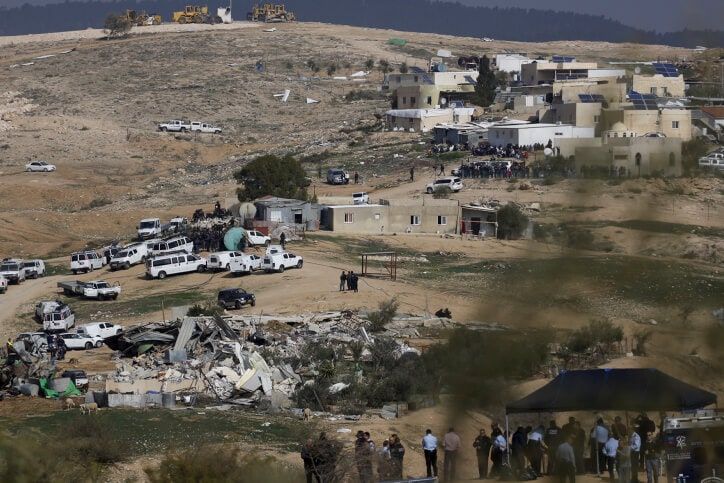In his New York Times op-ed “Israel Bulldozes Democracy,” Israeli Arab MK Aymon Odeh presents a wide range of incorrect “facts,” and even some blatant lies.
By printing incorrect information without context, disclosure or refutation, The New York Times bulldozes journalistic ethics, and for that matter, truth itself. Or to put it in the famous words of the late Senator Daniel Patrick Moynihan, “Everyone is entitled to his own opinion, but not to his own facts.”
Join the fight for Israel’s fair coverage in the news
Odeh begins his essay with an utterly irrelevant reference to President Trump which includes evocative phrases like “hate and fear.” Regardless of one’s emotions toward the new US President, the reference has absolutely nothing to do with Israel. It is a cheap ploy to gain the sympathy of those New York Times readers who are anti-Trump, as is the newspaper itself.
From that incongruous starting point, the New York Times op-ed launches into a laundry list of lies, fabrications and half truths.
Here are just a few examples:
Arabs make up one-fifth of Israel’s population, yet only 2.5 percent of the state’s land is under Arab jurisdiction.
The statement doesn’t even make logical sense: all of Israel is under the jurisdiction of Israel’s democratic government. It is a mystery where his 2.5 percent figure even came from.
And since the founding of the state, more than 700 new towns and cities have been built for Jews, while no new cities have been built for Arabs.
The statement is simply false: numerous Arab communities were either built by Israel, or built with Israeli assistance from small outposts into large, thriving cities and towns: such as the Bedouin Arab town of Hura or the city of Rahat, Segev Shalom (Shaqib al-Salam), Tel Sheva (Tel as-Sabi), Kseifeh, Lakia, or Aroer. There are also many new and planned towns and villages currently in progress as well as a four billion dollar budget allocation for new upgrades to Arab communities and another recently approved three billion shekel program in addition to that.
Odeh does not have merely an alternate opinion, he is describing an alternate reality.
Speaking specifically about towns built illegally without permits or approvals (and in some cases without even land ownership) Odeh complains that:
…the state has refused to provide even basic services like water, electricity utilities, paved roads and schools.
For illegally built towns??
Inequalities between Jewish and Arab sectors are a real problem that Israel faces, and a frequent topic of debate in Israeli society. Nonetheless, most modern locales in the world require government approval before building. Far from connecting utilities or building schools, governments around the globe commonly demolish non-permitted construction.
It is not unreasonable to question the efficiency or even fairness of Israel’s housing bureaucracy, in fact many Israelis do. However to claim that Israel had refused to provide utilities or build infrastructure for no reason is, in this case, simply a distortion of fact.
Odeh misleadingly and provocatively claims:
Worse, because the Israeli government refuses to recognize these villages’ existence, they all live under the shadow of demolition orders from the state.
Again, Odeh simply avoids speaking of the many legally built Arab cities and towns, that coordinate with the national government on infrastructure, utilities, urban planning, and live under no “shadow of demolition orders.”

In an absolutely mind bending distortion of reality, Odeh claims:
…when it became clear that the government would…evacuate Amona, an illegal settlement in the occupied West Bank …Mr. Netanyahu vowed to destroy Arab homes throughout Israel in retribution.
It is utterly unclear what he is referring to: as a rule, Odeh doesn’t quote to sources for any of his claims.
In fact, Netanyahu promised to build new homes and even to build a new settlement for the first time in some 25 years. While these programs are a source of controversy and debate within Israeli society, none calls for destroying Arab homes or for “retribution.”
Just when you thought the essay couldn’t get more surreal, Odeh distorts the very nature of space and time by going on to say:
The prime minister soon made good on his threat. That was why, a few weeks later, a huge force of armed police arrived to destroy homes in the unrecognized village of Umm al-Hiran.
In fact, the Umm al-Hiran case had been making its way through the Israeli court system for 13 years, before a judge (not the Prime Minister) issued a demolition order. Is Odeh seriously suggesting the Prime Minister traveled 13 years backwards in time to plant the seeds of his eventual “retribution” via a protracted, decade long legal battle?

It is more likely that this confluence of events merely demonstrates that in Israel, the rule of law applies equally to all towns and communities: whether Jewish or Arab.
Odeh’s next claim is nothing short of racial provocation:
…the government has moved to destroy Umm al-Hiran so that a religious Jewish community can be built in its place.
As usual, with no source, it is impossible to know where Odeh got the idea that the new community in the area is only for religious Jews. In fact, the planned community of Hiran is open to residency by any Israeli, regardless of religion or ethnicity. Private discrimination is a constant topic of debate in Israel, and a challenge many Israelis look to overcome. However according to Israeli law discrimination in housing is illegal, and there is therefore no such thing as a town that is limited by religion or ethnicity.
It is entirely legitimate to criticize Israel, its laws and its practices. However, if one must lie in order to do so, then the New York Times has a professional obligation to either reject the op-ed, or to disclose the factual shortcomings to its readers.
Al-Hiran photo by Hadas Parush/Flash90; Rahat photo CC by Amir Eliovrah via Pikiwiki;


